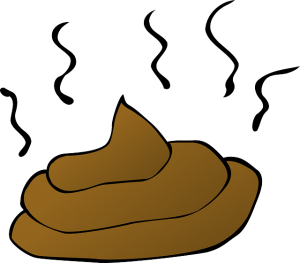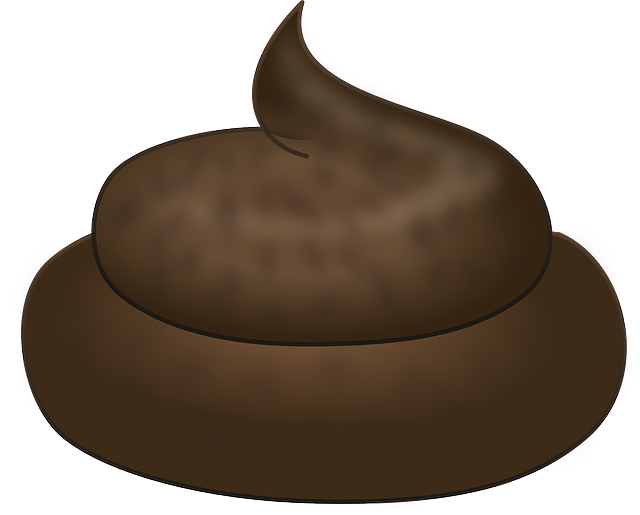Okay, yes, this is a weird subject to be talking about, we get it. But, just because it's weird, doesn't mean it's not important. In fact, one of the most important questions you can ask is “What is healthy poop?”
It’s very important because your poop says about you and your health, especially since it can be a symptom of something bigger. By ignoring the obvious signs, you might be ignoring the message your body is trying to send, asking for help.
When it comes to our poop, there are no globally accepted standards for what is normal.
This is because “normal” is different depending on your body type. The frequency, texture, size, and consistency, all depend on what the doshas that make up your body type are.
What is Healthy Poop?
Conventional medicine states that having as few as two bowel movements a week is within the normal range. But according to Ayurveda, one should have at least one bowel movement each day to rid the waste and toxins from the day before.
For some people, once a day is normal. For others, three times a day is normal. As long as there’s no digestive problems or complaints – that’s all okay.
Normal also means that you’re not constipated or suffering from diarrhea. since those are two key signs pointing out that something is wrong on the inside.
Bowel Movements Depend on Various Factors
Everybody’s bowel movements are different, and they depend on various factors. You need to consider:
- Your body type
- Genetics
- Dietary habits
- Proper hydration
- Medication used
- Health problems
Let’s use logic here for a second.
Sometimes you eat foods that just don’t agree with you very well and sometimes you simply don’t drink enough water.
Sometimes you eat lots of vegetables, rich in fiber, and sometimes you eat a lot of cake, rich in nothing beneficial for our health.
Sometimes you’re under a lot of stress, while sometimes you’re very close to nirvana.
Also, your bowel movements can also change from season to season.
The factors change all the time, so it’s completely normal that your stool changes from time to time too.
What Actually is Poop?

This question might have crossed your mind, or you might be curious. Human feces are the remains of the food that could not be digested or absorbed by the small intestine but has been rotted down by the bacteria in the large intestine.
It contains bacteria and a small number of metabolic waste products. That said, it’s commonly mistaken that feces are actually mostly food our body failed to digest. When in actuality, up to 80 percent of our poop is bacteria!
We all know where it’s discharged from and what happens with it afterward, so we’re not going to talk a lot about that.
Another interesting thing is that men and women poop completely differently!
Do you wonder why?
Well, women’s colons hang a little bit lower than men’s. It’s also a fact that women are much more prone to bloating. This is because it’s way more challenging for them to make the passage of the stool, as it takes longer to move through their bodies.
These differences are so significant, that scientists say they could perform a colonoscopy and guess the patient's gender based on them!
Poop Classification According to Ayurveda
Ayurveda teaches healthy elimination happens one to two times a day. Ideally, your first bowel movement should happen within an hour of waking. If there is a second elimination later in the day, it often happens after a meal, in the afternoon or evening.
The Perfect Poop
-
A healthy bowel movement is well formed, about the consistency of a ripe banana and it floats
-
It's brown in color
-
Does not stick to the toilet
-
Easy to wipe – no mess
-
Minimal Odor
Vata Type

Pitta Type

Kapha Type

Constipation
If your stool is hard and difficult to pass, it indicates constipation. The large intestine tries to remove water from the stool while it’s passing through the gut. The stool stays in the large intestine longer, which means more water is drawn, making the stool harder.
Luckily, a hard stool is easy to avoid by intaking more fiber through your diet. Fiber acts like a sponge and they are definitely going to help your stool preserve more water.
Another reason for constipation could be lack of water causing dehydration. Another potential reason for dehydration is too much alcohol or vomiting.
Diet for Constipation
Generally, if you are experiencing constipation, focus on eating warm foods and fluids. Include foods rich in fibers like wheat bran, oatmeal, and whole grains.
Include fruits, veggies, as well as legumes. Increase the number of healthy oils in your diet. Ghee and olive oil are especially important.
Herbs for Constipation
Also, you can support your elimination with Triphala, Psyllium, and Slippery Elm
Learn More about Slippery Elm Prebiotic Formula
Lifestyle for Constipation
Make sure you get moderate exercises like hiking, walking, swimming or gentle yoga. (Sun Salutations are perfect!)
Diarrhea
On the side of the spectrum is diarrhea. People who have a lot of fire (Pitta) in their constitution tend to experience diarrhea more often. Their stools may also burn when eliminated, and they may have a strong sour smell.
Diarrhea can be really unpleasant, especially if it has completely liquid consistency. It can quickly lead to dehydration and the loss of many important nutrients.
As with constipation, fibers play an important role in diarrhea cases as well. Just like fiber can soften a hard stool, it can also help harden the stool that lacks consistency or is too soft.
Diet for Diarrhea
When you have diarrhea, it's best to eat cooling foods, drinks, and spices. Coconut water, peppermint tea, cilantro, coriander, fennel, and mint are all good choices.
Herbs For Diarrhea
When you have diarrhea, consider taking Amalaki.
Lifestyle for Diarrhea
Focus on relaxation and make sure that your exercise is not intense. Walking, hiking, cycling in the early morning or after the sun sets is best. Practice slow easy yoga and make sure to include cooling poses like “legs up the wall” pose. Alternate nostril breathing is also highly recommended.
The Color of Your Poop

Okay, we’re all adults here. Let’s not pretend we don’t check up on our poop after we’re done. Curiosity is completely normal. The examination of your stool will help you understand the health of your digestive system
If your stool is any other color besides brown, it’s most likely due to something you ate. Many foods can change the color of the stool. But it can also be the result of certain medications or supplements.
It’s usually harmless, but in certain cases, the color change can indicate something more serious. So, let’s take a look at what different colors mean.
Brown
Our stool is usually a light or dark brown color, and that’s because of the combination of bile and bilirubin. Bilirubin is green as it's produced into bile but turns brown by the time it enters the large intestine.
Yet, there are more factors that determine the color of your poop. Below are some reasons for color changes. If there is a color change in your elimination repeatedly, it's important to talk to your doctor about it because it could be a sign of a medical condition.
White
White stools can often happen due to the problems with bile getting into our gastrointestinal tract or if the liver is not making enough of bile. If the bile duct is blocked due to a tumor or a stone, bile is not going to be able to reach the intestine and the stool will be white. This color is pretty common in liver diseases, such as hepatitis and cirrhosis.
Additionally, certain medications can turn stool white. So, if you’ve been on a new prescription therapy, ask your doctor is this normal. If it is – then you can ignore it while you are using the certain medication. But, if it persists after you have stopped using it, you might want to ask your doctor again to check up on that.
Black or almost black
A black stool can be a sign of an ulcer bleeding in your gastrointestinal tract. It's black because the blood changed its color while traveling through the digestive tract.
Another common reason for this color is Pepto Bismol, which changes the color dark. A darker stool can also happen due to high levels of iron.
Bluish
Besides being the consequence of a certain food coloring, it can also be a consequence of a Prussian blue color used in the treatment of radiation, cesium, and thallium poisoning.
Yellowish
If your poop is yellow, it could be from antacids or excessive dairy consumption. It may also indicate problems with your gallbladder or liver, celiac disease, or even chronic pancreatitis. If it is yellowish and greasy or oily, and it floats in the water, it’s probably because your body has a hard time digesting fats.
This can be a result of many different things, such as having your gallbladder removed. Some weight-loss medications can also color the stool yellow.
Green
A tinted green stool is likely because you ate something green, like lots of leafy greens. But it can also be caused by excess iron in your diet because if not digested properly, iron stains the poop green.
If the stool is constantly colored, completely unrelated to food, it could be a sign of infection.
Red
Before you start panicking, think about what you ate recently. If the answer is something very red-pigmented, like beets or even any kind of reddish berries, that’s most likely the cause for a change of color.
If the answer is no or you are not sure, it could be a sign of blood in the stool. The blood can come from the intestines, and it definitely suggests a visit to your doctor. Red color can also indicate a polyp, diverticulitis, inflammation, or even colon cancer as the worst-case scenario.
What About Smell?

If I still have your attention after talking about the frequency and color of your stool, we can talk next about the smell.
Why does poop stink?
The odor is made up of certain odorant volatiles, like methyl sulfides and benzo pyrrole volatiles.
No matter what color, stools normally have a very unpleasant smell due to the bacteria in the colon. These bacteria are not bad per se, they actually help break down the food!
But if the smell of your stool changes from bad to worse, that can be a sign of an infection, celiac disease, cystic fibrosis, pancreatitis, or lactose intolerance.
Diet can also affect the smell of poop. For example, combining protein with refined sugars and simple carbs is never a good idea.
What's worse is that it will probably cause you a stomachache. This is because simple carbs and refined sugars tend to digest very quickly while proteins need a little bit more time. For this reason, they will be sitting in the gastric acid for a long time and rot.
This is bad because the absorption of the amino acids from protein is going to be affected. This means you wasted a good protein. And because the rotting process creates excess gas and stool made out of rotten food is going to smell way worse than usual.
Learn How to Read the Signs
Why would you even care about all this?
What’s the point of inspecting your stool?
Well, it’s not a waste of your time, for sure! Your elimination can be a sign of certain conditions, like IBS – irritable bowel syndrome, ulcerative colitis or Crohn’s disease.
For example, diarrhea or constipation, or alternating between these two, as well as stomach or abdominal pain and excess gas are the first signs of the irritable bowel syndrome.
Crohn's disease involves constant, chronic diarrhea followed by weight loss, fever, and abdominal pain.
Ulcerative colitis is very similar to Crohn’s disease and the key factor in recognizing it is chronic diarrhea that often times becomes bloody.
These are all visible signs. But they are definitely not the only way you can tell what’s going on in your body – there’s also a bunch of information available on the microscopic level.
Stool Samples
Here you’ll need a little bit of help from the professionals. This is the exact reason why for a lot of exams required you to bring a stool sample. It's not just to make you uncomfortable.
The bacteria in your stool can be analyzed in the laboratory. And it’s been proven that the range of bacteria in the gut can have implications for a range of different health conditions.
Experts say that the bacteria found in the gut play an important role in regulating our immune system, as well as in the development of above-mentioned diseases.
Sometimes you might even be able to spot food remnants in your feces. Most often this includes seeds, corn, nuts, and beans. Why does this happen?
Well, it’s mostly because of their high fiber content and the fact that they need a lot more time to digest. In some cases, like tomato or watermelon seeds, for example, they don’t get digested at all, which is why they leave our body the same way they went in.
What Are the Most Important Signs?

Nobody wants to spend too much time inspecting their number two, so let’s break down the five of the most important things you should be looking after.
- Blood in Your Stool – Even a small amount of blood in your poop on a regular basis is troubling and worrisome! It can be a sign of many different things, such as anal fissures or hemorrhoids, polyps or an inflammatory bowel disease, and in the worst-case scenario – a sign of cancer.
- Change in Consistency – Diarrhea is normal from time to time, even in healthy people. But, if you used to have solid bowel movements and now you’re having frequent diarrheas, that could be a sign of abnormality. For example, Crohn’s disease or ulcerative colitis, especially if it’s followed by bleeding or weight loss.
- Chronic Diarrhea – This can be as normal as the sign of the food intolerance. But, it can also be the sign of ulcerative colitis and other colon disorders, as well as the irritable bowel syndrome or IBS.
- Color Change – As before explained, the change in color is very telling and different colors suggest different things. Refer to the section above and find the exact color you are looking for, so you can understand better what it means.
- Constipation – This is most likely due to the lack of water and proper hydration. But, it can also be a side effect of certain medication, as well as the irritable bowel syndrome.
How To Improve the Quality of Your Bowel Movements
Our body is really great showing us on the outside if there are any problems on the inside.
First off, if you’re having chronic issues with your stool, you should get checked out by a professional. You can work most of the issues out pretty quickly with either lifestyle changes.
Some, of course, are more serious, such as irritable bowel syndrome. IBS is a chronic condition and it requires long-term care.
With that being said, here are just a few tips on what you can do to try and prevent any problems whatsoever:
- Try eating a lot of unprocessed foods, including vegetables, because they are very rich in fiber
- Avoid artificial sweeteners of any kind
- Avoid excessive caffeine, as it’s a fact that caffeine affects the frequency of bowel movements
- Help your intestinal flora by eating naturally fermented foods to your diet, such as pickles, yogurt, and kefir for example
- If that doesn’t help, or if you simply can’t get enough good bacteria from your diet, consider taking a probiotic supplement
- Drink plenty of water, there’s really no such thing as too much water
- If you are on certain medication, ask your healthcare provider if they can affect your stool
- Add exercise to your daily routine
- Try minimizing the stress by including yoga or meditation in your life
- Take Triphala every night before bed
As you can see, you can do quite a lot to help yourself and your bowel movements out by simply implementing certain lifestyle changes.
We should pay way more attention to our stool, just like we’re paying attention to, let’s say, our weight or blood pressure. It can help us prevent certain issues or catch them in their early phases if we react to symptoms immediately.
The most important thing is not to ignore your body asking for help.
The good news is that you can fix almost anything if you act on time. So, keep this in mind next time you see think that something might be wrong.
Obviously, your poop is much more important than you thought. so next time when you’re doing the number two, make sure to take a closer look before all that information goes down the drain!
Ayurveda Lifestyle Products



